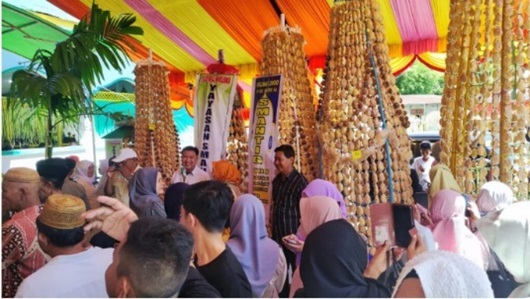Application of the Concept of Community Based Tourism in Walima Festival Tourism Objects, Bongo Village, Gorontalo Province
DOI:
https://doi.org/10.33084/pengabdianmu.v9i12.7263Keywords:
Empowerment, Tourism, Festival WalimaAbstract
Tourism villages are tourism assets that are empowered and developed with all their uniqueness and attractiveness to attract tourist visits to the location of the village. The empowerment of Assisted Villages aims to apply the concept of community-based tourism in Bongo religious tourism village to Walima Festival tourism objects. The role of the community in this concept is very important for the sustainability of tourism. The use of community-based tourism methods can improve people's welfare in the economic sector. One of the interesting attractions in Bongo Tourism Village is the Walima Festival. Despite the uniqueness and advantages of this tourist attraction, it has not been managed properly. This activity goes through several stages, namely: planning, implementing, and evaluating the management of Walima Festival tourism objects, strengthening the role of the community, and technical guidance. The results show there is an increase in governance in Walima Festival tourism, local people's understanding of active participation in Walima Festival tourism, and an active role from the MSME sector as a craft provider and the Pokdarwis Group as a tour organizer.
Downloads
References
Antara, M., & Arida, S. (2015). Panduan Pengelolaan Desa Wisata Berbasis Potensi Lokal. In Konsorium Riset Pariwisata Universitas Udayana (Vol. 23). Konsorium Riset Pariwisata Universitas Udayana. https://doi.org/10.33379/icom.v3i3.2963
Gao, J., & Wu, B. (2017). Revitalizing traditional villages through rural tourism: A case study of Yuanjia Village, Shaanxi Province, China. Tourism Management, 63, 223–233. https://doi.org/10.1016/j.tourman.2017.04.003
Havadi Nagy, K. X., & Espinosa Segui, A. (2020). Experiences of community-based tourism in Romania: chances and challenges. Journal of Tourism Analysis: Revista de Análisis Turístico, 27(2), 143–163. https://doi.org/10.1108/JTA-08-2019-0033
Itah Masitah. (2019). Pengembangan Desa Wisata Oleh Pemerintah Desa Babakan Kecamatan Pangandaran Kabupaten Pangandaran. Jurnal Ilmiah Ilmu Administrasi Negara, 6(3), 45. https://doi.org/http://dx.doi.org/10.25157/dinamika.v6i3.2806
Krisnandela, V. A., Muliani, B., Damayanti, S. A., & Wahyudi, K. E. (2023). Urgensi Partisipasi Masyarakat Dalam Pengembangan Potensi Wisata Di Desa Sambirejo Kecamatan Wonosalam Kabupaten Jombang. Jurnal Ilmiah Wahana Pendidikan, 9(20), 707–715. https://doi.org/10.5281/zenodo.8437561
Pranoto, B., Utami, T., & Sunesti, Y. (2023). Pengembangan Desa Wisata Berjo Menuju SDGs Desa Mandiri dan Berkelanjutan. Jurnal Ilmu Sosial Dan Humaniora, 12(2), 381–395. https://doi.org/10.23887/jish.v12i2.61185
Rasoolimanesh, S. M., Ringle, C. M., Jaafar, M., & Ramayah, T. (2017). Urban vs. rural destinations: Residents’ perceptions, community participation and support for tourism development. Tourism Management, 60, 147–158. https://doi.org/10.1016/j.tourman.2016.11.019
Rosalina, P. D., Dupre, K., & Wang, Y. (2021). Rural tourism: A systematic literature review on definitions and challenges. Journal of Hospitality and Tourism Management, 47, 134–149. https://doi.org/10.1016/j.jhtm.2021.03.001
Syarifuddin, D. (2022). Model Pengembangan Desa Wisata Melalui Pemberdayaan Masyarakat Di Desa Ciburial. Jurnal Ilmiah Manajemen, Ekonomi, & Akuntansi (MEA), 6(3), 111–129. https://doi.org/10.31955/mea.v6i3.2298
Vitasurya, V. R. (2016). Local Wisdom for Sustainable Development of Rural Tourism, Case on Kalibiru and Lopati Village, Province of Daerah Istimewa Yogyakarta. Procedia - Social and Behavioral Sciences, 216, 97–108. https://doi.org/10.1016/j.sbspro.2015.12.014

Downloads
Published
How to Cite
Issue
Section
License
Copyright (c) 2024 Ismet Sulila, Weny Almoravid Dungga, Tineke Wolok, Barmin Rahmat Yusuf, Krisna Anugrah, Sartika Dewi Usman, Ivan Rahmat Santoso

This work is licensed under a Creative Commons Attribution-ShareAlike 4.0 International License.
Authors who publish with this journal agree to the following terms:
- Any article on the copyright is retained by the author(s).
- Author grant the journal, right of first publication with the work simultaneously licensed under a Creative Commons Attribution License that allows others to share work with acknowledgment of the work authors and initial publications in this journal.
- Authors are able to enter into a separate, additional contractual arrangements for non-exclusive distribution of published articles of work (eg, post-institutional repository) or publish it in a book, with acknowledgment of its initial publication in this journal.
- Authors are permitted and encouraged to post their work online (e.g., in institutional repositories or on their websites) prior to and during the submission process, as can lead to productive exchanges, as well as earlier and greater citation of published work.
- The article and any associated published material is distributed under the Creative Commons Attribution-ShareAlike 4.0 International License










